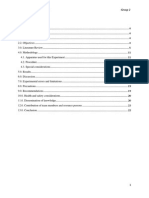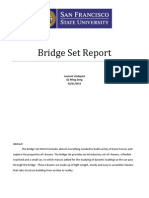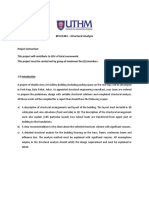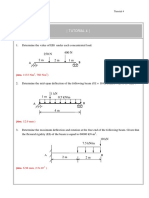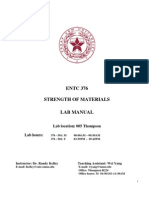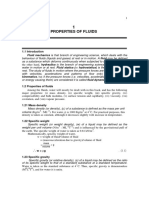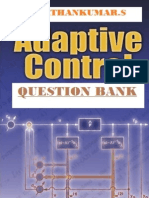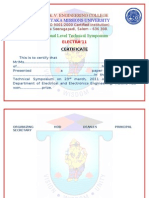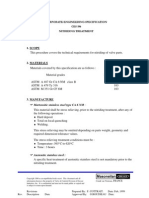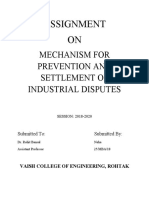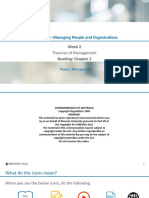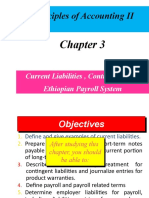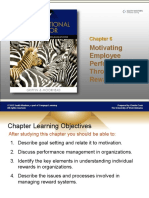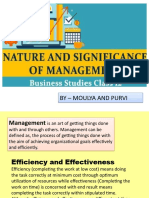Engineering Management and Ethics QB 2013
Engineering Management and Ethics QB 2013
Uploaded by
MATHANKUMAR.SCopyright:
Available Formats
Engineering Management and Ethics QB 2013
Engineering Management and Ethics QB 2013
Uploaded by
MATHANKUMAR.SOriginal Description:
Copyright
Available Formats
Share this document
Did you find this document useful?
Is this content inappropriate?
Copyright:
Available Formats
Engineering Management and Ethics QB 2013
Engineering Management and Ethics QB 2013
Uploaded by
MATHANKUMAR.SCopyright:
Available Formats
ENGINEERING MANAGEMENT AND ETHICS QUESTION BANK
UNIT I Part-A (2 Marks)
1) Define decision making. 2) State the relationship between decision and decision making? 3) Define Decision. 4) What do you mean by programmes? 5) Define Zero base budget. 6) What do you mean by methods? 7) Define Planning. 8) Define policy. 9) List out any four essential needs of planning. 10) Define MBO. 11) Define sales forecasting. 12) Define objectives. 13) List out the various steps of planning. 14) What is feedback? 15) Define follow up. 16) What you mean by tangible premises? 17) What you mean by Controllable premises? 18) What you mean by internal premises? 19) What do you mean by Mission? 20) What do you mean by Vision? 21) What is planning premises? 22) What do you meant by strategic decision? 23) Write down any four factors which affect the strategic planning. 24) What is meant by MBE. 25) Define budgets. Part-B (12 Marks) 1) Discuss about the steps involved in decision making process. 2) Explain the various kinds of decisions in detail.
3) Explain the various steps of planning process. 4) Briefly explain the various types of plans. 5) Explain the various steps involved in MBO process 6) Describe the steps involved in strategic planning process. 7) Write an essay on planning premises. 8) Describe in detail the nature and characteristics of objectives. 9) Distinction between Objectives and Policies 10) a) Discuss the differences between policies and strategies. b) Discuss the differences between policy and procedure.
UNIT II
Part-A (2 Marks) 1. 2. 3. 4. 5. 6. 7. 8. 9. What are the essential conditions for effective organizing? Define organizational culture. Define matrix departmentation. Define Delphi technique. Define Formal organization. Define Informal organization. Define organizing. Mention any four characteristics of organizing. What do you mean by departmentation?
10. What do you mean by decentralization? 11. What is authority? 12. What is responsibility? 13. What do you mean by delegation of authority? 14. What do you mean by recruitment? 15. List out the merits of recruitment. 16. What do you mean by selection? 17. What do you mean by Interview? 18. What is performance appraisal? 19. What do you mean by training? 20. Define organizational development. 21. Define creativity.
22. What is job analysis? 23. What is job design? 24. What is functional departmentation? 25. What do you mean by Induction?
Part-B (12 Marks)
1. 2. 3. 4. 5. 6. 7. 8. 9. Explain the process of delegation, and the guidelines for effective delegation. Explain in detail about the decision making process. Discuss in detail about the various kinds of departmentation. Discuss in detail on matrix organization and its merits and demerits. Explain the differences between authority and responsibility. Give a brief account on organizational culture. Explain the various sources of recruitment? What are the advantages and disadvantages of internal sources of recruitment? Explain the various steps of selection process. Explain the various kinds of on-the-job training methods.
10. Discuss in detail the Human resource development.
UNIT III Part A ( 2 Marks)
1. Define directing.
2. What are the elements of directing function? 3. Define motivation. 4. List the importance of motivation. 5. What is leadership? 6. What do you understand the term communication? 7. Define direct communication. 8. Define written communication. 9. Define Status. 10. Define promotion. 11. Define transfer. 12. Define job satisfaction. 13. Mention any four assumptions of Theory X. 14. Mention any four assumptions of Theory Y. 15. Differentiate between motivation and satisfaction.
16. What is carrot and stick approach of motivation? 17. What are the qualities required for leaders? 18. What are the types of motivation? 19. What do you mean by oral communication? 20. What do you mean by Man Power Planning? 21. What do you mean by job enrichment? 22. Mention any two characteristics of leadership. 23. What do you mean by Diagonal communication? 24. Mention any two Barriers of communication. 25. What do you mean by electronic communication?
Part B (12 Marks)
1. 2. 3. 4. 5. 6. 7. 8. 9. Explain in detail on Maslows theory of needs Write an essay on Herzbergs two factors theory. Explain the various types of leadership styles. Briefly explain the various motivational techniques. Explain in detail on the determining factors of Span of Management. Explain in detail the line and staff authority. Describe in detail on the factors affecting staffing function. Briefly explain the steps of communication process with suitable example. Explain the barriers of communication. And how do you overcome the barriers?.
10. Discuss in detail about electronic media in communication. Unit - IV Part-A (2 Marks) 1. 2. 3. 4. 5. 6. 7. 8. 9. What are human values? Distinguish values from ethics and culture. Define work ethics. Write short notes on caring and sharing. What is courage as a value? Define spirituality. Give the two aspects of Honesty. State the differences between Self -respect and Self esteem. Define Ethics.
10. Define Engineering Ethics. 11. List out the types of Inquiry. 12. Define Moral Autonomy. 13. Define Integrity. 14. Define the term Honesty. 15. What are the forms of Self -respect? 16. List out the types of Morality theories. 17. Differentiate Hypothetical imperatives and Moral imperatives. 18. State Rawls principles. 19. Give the drawback of Duty Ethics. 20. Differentiate Ethical Relativism and Ethical Egoism. 21. Define Ethical Pluralism. 22. Define Religion. 23. What are personal ethics and business ethics? 24. What do you mean by normative ethics? 25. Mention some universally accepted ethical principles.
Part-B (12 Marks)
1. Engineering as experimentation Discuss. 2. Explain in detail on challenger case study. 3. Discuss the various steps of confronting moral dilemmas. 4. Explain the method of fault tree analysis. Also list out the advantages and limitations of fault tree analysis. 5. How the manufacturer does understood the risk in a product help? 6. How does the knowledge of uncertainties in design help the engineers to accept the risk of a product? 7. Write an essay on the role of code of ethics. 8. Write a detailed note on the balanced outlook on law. 9. Write a detailed note on (a) Codes and the experimental nature of engineering; (b) Limitations of codes. 10. The engineering experiments in the filed exhibit discuss in detail.
Unit V Part-A ( 2 Marks)
1. What do you mean by ethical subjectivism?
2. 3. 4. 5. 6. 7. 8. 9. 10. 11. 12. 13. 14. 15. 16. 17. 18. 19. 20. 21. 22. 23. 24. 25.
List the steps in confronting moral dilemmas. What is moral autonomy? What are the attributes to a profession? List out the models of a professional society. What are the essential conditions required to define a valid consent? List out the purposes of various types of standards. Define Code. Enumerate the roles of codes. What are the problems associated with the law in engineering? What are the uncertainties occur in the model designs? Define Ethical Conventionalism. Define Risk. Define the term Disaster. Give the criteria which helps to ensure a safety design. List out the determining factors of safety and risk. What are the drawbacks in the definition of Lawrence? Give the categories of Risk. What are the factors that affect Risk Acceptability? What is the knowledge required to assess the risk? What are the analytical methods? What are the conditions referred as safe exit? How will an engineer assess the safety? What are the reasons for Risk -Benefit Analysis? Define Safety.
Part-B (12 Marks)
1. Compare the institutional authority and needed qualification? 2. Discuss in detail disasters in environmental ethics. 3. Explain the different types of confidential information. 4. Engineers as advisors in planning and policy making advisors- Discuss in detail. 5. Institution of Electronics and Telecommunication Engineers-Discuss in detail. 6. Write short notes on (a) Utility patent, (b) Design patent and (c) Plant patent. 7. Write an essay on human rights. 8. What is Computer Ethics? Explain in detail.
9. Differentiate between the Pro- and anti-views on unionism. 10. Can an Engineer function as a manager up holding Engineering ethics? Discuss.
You might also like
- First Time Managers Handbook PDFDocument29 pagesFirst Time Managers Handbook PDFNeelam Meghani100% (5)
- Oss Hand BookDocument14 pagesOss Hand BookBasiru Abubakar100% (1)
- Beam Reaction Experiment Group 2Document22 pagesBeam Reaction Experiment Group 2AnushaBheenuck100% (1)
- Material LaboratoryDocument14 pagesMaterial LaboratoryAnonymous tLXKwTNo ratings yet
- Course Code BFC20802 Course Name Computer Programming Faculty of Civil Engineering and Built Environment 1. 1Document5 pagesCourse Code BFC20802 Course Name Computer Programming Faculty of Civil Engineering and Built Environment 1. 1Ezanie IzyanNo ratings yet
- Cube TestDocument10 pagesCube Testridhuanzainal100% (1)
- Group H Civil Materials Lab 2A ReportDocument21 pagesGroup H Civil Materials Lab 2A ReportLanceNo ratings yet
- Faculty of Civil and Environmental Engineering Department of Structure and Material Engineering Lab MaterialDocument19 pagesFaculty of Civil and Environmental Engineering Department of Structure and Material Engineering Lab Materialalnz100% (1)
- Force in A Statically Indeterminate Cantilever TrussDocument7 pagesForce in A Statically Indeterminate Cantilever TrussOlivia Sim0% (1)
- Full As Contoh Member AkashahDocument29 pagesFull As Contoh Member AkashahWayen Bulat100% (1)
- Determination of Aggregate Impact ValueDocument10 pagesDetermination of Aggregate Impact ValueFernando Fakhry Capital MNo ratings yet
- Utilization of Compact Discs in Concrete Masonry Unit (Hollow Block) ProductionDocument7 pagesUtilization of Compact Discs in Concrete Masonry Unit (Hollow Block) ProductionAlexander Vaugn VillasisNo ratings yet
- Project Mechanic of Material by Using Mac Caulay MethodDocument29 pagesProject Mechanic of Material by Using Mac Caulay MethodFarah ArishaNo ratings yet
- Equal Payment SeriesDocument5 pagesEqual Payment SeriesMaya OlleikNo ratings yet
- Bridge Set Report FinalDocument12 pagesBridge Set Report Finalqimingzeng4667100% (1)
- Project+BFC21403+Sem+2+2014 2015Document3 pagesProject+BFC21403+Sem+2+2014 2015Mohammad AsnizamNo ratings yet
- GEO3701 Assessment 6 2021Document7 pagesGEO3701 Assessment 6 2021Tyburg R DhliwayoNo ratings yet
- Tutorial 4Document4 pagesTutorial 4楊子慶No ratings yet
- Maharashtra Metro Rail Co. LimitedDocument29 pagesMaharashtra Metro Rail Co. LimitedSumit BhagatNo ratings yet
- CON4316 Assignment 3 - QuestionDocument3 pagesCON4316 Assignment 3 - Questionsmithson JoeNo ratings yet
- Structure Lab-Three Hinge ArcDocument13 pagesStructure Lab-Three Hinge ArcFendi Roon100% (1)
- 3.0 Data Analysis 3.3 Linpro: Figure 1: Truss'S Members and JointDocument12 pages3.0 Data Analysis 3.3 Linpro: Figure 1: Truss'S Members and Jointfuad haziqNo ratings yet
- FM Lab ManualDocument76 pagesFM Lab ManualsidharthNo ratings yet
- CEC 105 ExamDocument2 pagesCEC 105 ExamZaid Habibu100% (1)
- Information Detailed Discussion and Analysis Are Not Provided. These Reports Are Small in SizeDocument3 pagesInformation Detailed Discussion and Analysis Are Not Provided. These Reports Are Small in SizeCik MiaNo ratings yet
- Principles and Practice of ManagementDocument2 pagesPrinciples and Practice of ManagementGuruKPO100% (1)
- Lab Report 4Document16 pagesLab Report 4anon_68203647100% (1)
- 1.0 Job/Experiment No.: Me594/05 2.0 NAME OF EXPERIMENT: Angle Measurement Using Sine Bar & SlipDocument6 pages1.0 Job/Experiment No.: Me594/05 2.0 NAME OF EXPERIMENT: Angle Measurement Using Sine Bar & SlipHimanshu Vasistha0% (1)
- Lab Manual ENTC376 Fall08Document69 pagesLab Manual ENTC376 Fall08Aamir ShafiqueNo ratings yet
- Project Report Group 4Document28 pagesProject Report Group 4Akame TakashitaNo ratings yet
- 22Document11 pages22Farah AymanNo ratings yet
- CIV3506 2022 Assign2 Exemplary2Document33 pagesCIV3506 2022 Assign2 Exemplary2Neil WayneNo ratings yet
- ECE 4215 Pavement Analysis Design Worked ExamplesDocument8 pagesECE 4215 Pavement Analysis Design Worked ExamplesdantezNo ratings yet
- SAN2602 Assignment 1 2024Document4 pagesSAN2602 Assignment 1 2024Masithembe Tera DumezweniNo ratings yet
- 1 6 A Discoverengineering 1Document6 pages1 6 A Discoverengineering 1api-264758535No ratings yet
- Engineering Economics 3Document60 pagesEngineering Economics 3Muktar JemalNo ratings yet
- Total Station LabDocument15 pagesTotal Station LabSai Yashwanth NamalaNo ratings yet
- BUS 485 Final ReportDocument30 pagesBUS 485 Final ReportShahida HaqueNo ratings yet
- Linear Survey ReportDocument4 pagesLinear Survey ReportMbabazi IvanNo ratings yet
- Shear Force and Bending Moment Full ReportDocument8 pagesShear Force and Bending Moment Full ReportMANAPNo ratings yet
- CT Lab ManualDocument26 pagesCT Lab ManualJagathChandraNo ratings yet
- Tutorial Letter 101/3/2018: Fundamental RightsDocument22 pagesTutorial Letter 101/3/2018: Fundamental RightsJabulani MakanyaNo ratings yet
- Bfc43103 Project Report - Group2 - Section 4Document44 pagesBfc43103 Project Report - Group2 - Section 4Juraini Binti Abdul SaadNo ratings yet
- Earth Quake Engineering-QbDocument7 pagesEarth Quake Engineering-QbravirainbowNo ratings yet
- Compiled Infrastructure Assignment KadduDocument25 pagesCompiled Infrastructure Assignment Kadduomonaedwin2No ratings yet
- Cemb111 Civil Engineering Materials Laboratory Exp1Document22 pagesCemb111 Civil Engineering Materials Laboratory Exp1damnable_phantom31610% (1)
- Ce 442 Foundation Engineering II - Tedu s1617 - SyllabusDocument8 pagesCe 442 Foundation Engineering II - Tedu s1617 - SyllabusRex MayabangNo ratings yet
- Properties of Fluids NotesDocument14 pagesProperties of Fluids NotesMavineNo ratings yet
- Exp 1 G5Document24 pagesExp 1 G5Abdullah Helmi100% (1)
- Experiment: Torsion of A Spiral Spring: Vibrations LabDocument4 pagesExperiment: Torsion of A Spiral Spring: Vibrations LabVenkata DineshNo ratings yet
- Dokumen - Tips Cec 103 Workshop Technology 1Document128 pagesDokumen - Tips Cec 103 Workshop Technology 1Yusuf MuhammedNo ratings yet
- Experiment #3: Energy Loss in Pipe FittingsDocument6 pagesExperiment #3: Energy Loss in Pipe FittingsMustafa AltarhoniNo ratings yet
- Structural Design I - Steel AssignmentDocument21 pagesStructural Design I - Steel AssignmentAvi2617No ratings yet
- Universiti Tun Hussein Onn Malaysia: ConfidentialDocument3 pagesUniversiti Tun Hussein Onn Malaysia: ConfidentialZahirah SaffriNo ratings yet
- HallDocument30 pagesHallMuhammad Faheem100% (1)
- Basic Surveying PDFDocument66 pagesBasic Surveying PDFSulchan Purnama SaputraNo ratings yet
- DCM2601 Major Test 1 Semester 2 2023Document2 pagesDCM2601 Major Test 1 Semester 2 2023Rachel Du PreezNo ratings yet
- A Catalogue of Details on Pre-Contract Schedules: Surgical Eye Centre of Excellence - KathFrom EverandA Catalogue of Details on Pre-Contract Schedules: Surgical Eye Centre of Excellence - KathNo ratings yet
- Some Mooted Questions in Reinforced Concrete Design American Society of Civil Engineers, Transactions, Paper No. 1169, Volume LXX, Dec. 1910From EverandSome Mooted Questions in Reinforced Concrete Design American Society of Civil Engineers, Transactions, Paper No. 1169, Volume LXX, Dec. 1910No ratings yet
- Biomedical Engineering Project: A Biosensor Based On Silver Enhanced Self Assembled Rfid Antenna.Document4 pagesBiomedical Engineering Project: A Biosensor Based On Silver Enhanced Self Assembled Rfid Antenna.MATHANKUMAR.SNo ratings yet
- Matlab Basic Questions Without AnswersDocument1 pageMatlab Basic Questions Without AnswersMATHANKUMAR.SNo ratings yet
- Electrical Engineering QUESTION BANKDocument7 pagesElectrical Engineering QUESTION BANKMATHANKUMAR.S100% (1)
- Adaptive Control Question Bank Without Answer KeyDocument5 pagesAdaptive Control Question Bank Without Answer KeyMATHANKUMAR.S100% (1)
- Telemedicine-Introduction: Telemedicine Is The Remote Communication of Information To Facilitate Clinical CareDocument8 pagesTelemedicine-Introduction: Telemedicine Is The Remote Communication of Information To Facilitate Clinical Caresuhail_ahmed018No ratings yet
- Biomedical Engineering Alumi Details (Vmkvec)Document3 pagesBiomedical Engineering Alumi Details (Vmkvec)MATHANKUMAR.SNo ratings yet
- Module 1 Lecture 1 What Is InformaticsDocument28 pagesModule 1 Lecture 1 What Is InformaticsMATHANKUMAR.SNo ratings yet
- Call Center Faculty DetailsDocument6 pagesCall Center Faculty DetailsMATHANKUMAR.SNo ratings yet
- Sponsor Project List EEEDocument3 pagesSponsor Project List EEEMATHANKUMAR.SNo ratings yet
- Top Three Rankers in EIEDocument1 pageTop Three Rankers in EIEMATHANKUMAR.SNo ratings yet
- Top Three Rankers in BMEDocument1 pageTop Three Rankers in BMEMATHANKUMAR.SNo ratings yet
- Sym CertificateDocument2 pagesSym CertificateMATHANKUMAR.SNo ratings yet
- Biomaterials PPT - IITDocument12 pagesBiomaterials PPT - IITMATHANKUMAR.SNo ratings yet
- Nitriding Ces-196 ADocument3 pagesNitriding Ces-196 AMATHANKUMAR.SNo ratings yet
- Embedded System Lession PlanDocument4 pagesEmbedded System Lession PlanMATHANKUMAR.SNo ratings yet
- V. M. K. V. Engineering College, Salem: Vinayaka Missions UniversityDocument1 pageV. M. K. V. Engineering College, Salem: Vinayaka Missions UniversityMATHANKUMAR.SNo ratings yet
- Breast Cancer (Research Paper)Document12 pagesBreast Cancer (Research Paper)Katrina Arnaiz100% (4)
- V. M. K. V. Engineering College, Salem: Vinayaka Missions UniversityDocument1 pageV. M. K. V. Engineering College, Salem: Vinayaka Missions UniversityMATHANKUMAR.SNo ratings yet
- Demodulation of AM & Demodulation of Comparison of Amplitude Modulation SystemsDocument4 pagesDemodulation of AM & Demodulation of Comparison of Amplitude Modulation SystemsMATHANKUMAR.SNo ratings yet
- Ed LPDocument2 pagesEd LPMATHANKUMAR.SNo ratings yet
- Seminar-I Assignment-IDocument2 pagesSeminar-I Assignment-IMATHANKUMAR.SNo ratings yet
- Mechanism For Prevention and Settlement of Industrial DisputesDocument9 pagesMechanism For Prevention and Settlement of Industrial DisputesAnkush AggarwalNo ratings yet
- District Employment Office, Pro Employment Reg.Document2 pagesDistrict Employment Office, Pro Employment Reg.partheeban25No ratings yet
- Strategies For A High Performance Revenue CycleDocument40 pagesStrategies For A High Performance Revenue CycleaneeethaNo ratings yet
- Week 2 - Theories of ManagementDocument41 pagesWeek 2 - Theories of ManagementJhon EinarNo ratings yet
- Sustainable Construction: Constructors: Who Should Read This Factsheet?Document5 pagesSustainable Construction: Constructors: Who Should Read This Factsheet?Chris FindlayNo ratings yet
- Hui-Bfb-6E Group 7Document11 pagesHui-Bfb-6E Group 7thaothao5694No ratings yet
- Chapter 3 Current Liability PayrollDocument39 pagesChapter 3 Current Liability PayrollAbdi Mucee Tube100% (1)
- CHAPTER 6 Motivating Employee Performance Through RewardsDocument25 pagesCHAPTER 6 Motivating Employee Performance Through RewardsKim Ravanzo0% (1)
- Bulletin 145Document18 pagesBulletin 145Melissa PeacockNo ratings yet
- Reward Management SystemDocument15 pagesReward Management Systemmohit pandeyNo ratings yet
- Francisco v. NLRCDocument2 pagesFrancisco v. NLRCAlelie Joy MalazarteNo ratings yet
- Overview of IAS 19Document9 pagesOverview of IAS 19amitsinghslideshareNo ratings yet
- By - Moulya and PurviDocument11 pagesBy - Moulya and PurviPurvi SinghNo ratings yet
- New Brunswick Labour Market Stream: Guide For The New Brunswick Provincial Nominee Program Express Entry CategoryDocument21 pagesNew Brunswick Labour Market Stream: Guide For The New Brunswick Provincial Nominee Program Express Entry CategoryebenezerNo ratings yet
- 2020-21 Regional Business Plan Competition Judge Question BankDocument2 pages2020-21 Regional Business Plan Competition Judge Question Bankyea okay100% (1)
- Chapter 1 - Effective Communication in An OrganisationDocument25 pagesChapter 1 - Effective Communication in An OrganisationPerbz JayNo ratings yet
- Introduction To CS 106ADocument25 pagesIntroduction To CS 106Aapi-127299018No ratings yet
- Contract Labour Act, 1970 (2) Labour LawDocument18 pagesContract Labour Act, 1970 (2) Labour LawBakyashree VNo ratings yet
- Shannon M Johnson, METDocument5 pagesShannon M Johnson, METShannon JohnsonNo ratings yet
- Chữa Đề 10-2016, ĐhbkhnDocument113 pagesChữa Đề 10-2016, ĐhbkhnNguyễn ThoạiNo ratings yet
- 4-Ethnic, Religious and Group InfluencesDocument20 pages4-Ethnic, Religious and Group InfluenceseavanreaNo ratings yet
- Community Services Bullseye ChartDocument1 pageCommunity Services Bullseye ChartBaloo Nick Castles100% (1)
- How To Make An Application LetterDocument3 pagesHow To Make An Application LetterLyke Therese Sungahid - BagsacNo ratings yet
- Chapter 2 Review of Related Literature ADocument17 pagesChapter 2 Review of Related Literature AMay Ann OmoyonNo ratings yet
- VOIS Volunteer in Israel BrochureDocument4 pagesVOIS Volunteer in Israel BrochurerodineiNo ratings yet
- Organisational Study On Terumo Penpol PVT Ltd.Document73 pagesOrganisational Study On Terumo Penpol PVT Ltd.Subhi Kumar100% (1)
- Chemistry Interview Questions: There Are No Questions in This CategoryDocument12 pagesChemistry Interview Questions: There Are No Questions in This CategorySumit IrpachiNo ratings yet
- SOP For Construction Industry To Operate During MCODocument7 pagesSOP For Construction Industry To Operate During MCOWH TNo ratings yet
- Log India - March Edition 2012Document10 pagesLog India - March Edition 2012sukumaran321No ratings yet



